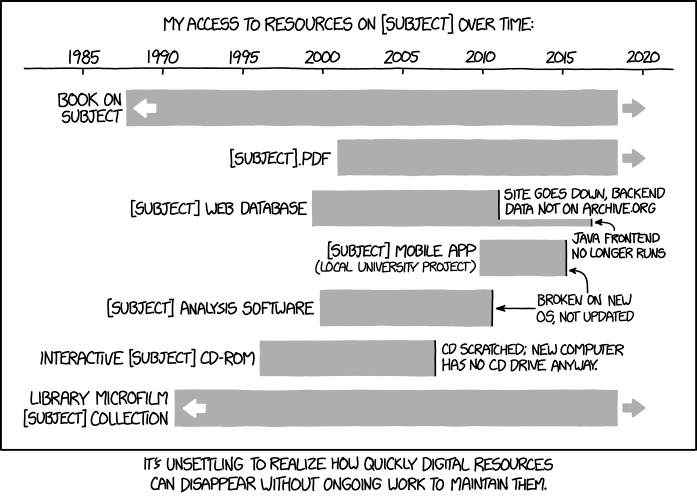Since 2008, most of Intel’s chipsets have contained a tiny homunculus computer called the “Management Engine” (ME). The ME is a largely undocumented master controller for your CPU: it works with system firmware during boot and has direct access to system memory, the screen, keyboard, and network. All of the code inside the ME is secret, signed, and tightly controlled by Intel. ... there is presently no way to disable or limit the Management Engine in general. Intel urgently needs to provide one.Recent events have pulled back the curtain somewhat and revealed that things are worse than we knew in May. Below the fold, some details.
I'm David Rosenthal, and this is a place to discuss the work I'm doing in Digital Preservation.
Tuesday, November 28, 2017
Intel's "Management Engine"
Back in May Erica Portnoy and Peter Eckersley, writing for the EFF's Deep Links blog, summed up the situation in a paragraph:
Tuesday, November 21, 2017
Has Web Advertising Jumped The Shark?
The Web runs on advertising. Has Web advertising jumped the shark? The relevant Wikipedia article says:
The usage of "jump the shark" has subsequently broadened beyond television, indicating the moment when a brand, design, franchise, or creative effort's evolution declines, or when it changes notably in style into something unwelcome.There are four big problems with Web advertising as it currently exists:
- Bad guys love it.
- Readers hate it.
- Webmasters hate it.
- Advertisers find it wastes money.
Thursday, November 16, 2017
Techno-hype part 2
Don't, don't, don't, don't believe the hype!
Public Enemy
Enough about the hype around self-driving cars, now on to the hype around cryptocurrencies.
Sysadmins like David Gerard tend to have a realistic view of new technologies; after all, they get called at midnight when the technology goes belly-up. Sensible companies pay a lot of attention to their sysadmins' input when it comes to deploying new technologies.
Gerard's Attack of the 50 Foot Blockchain: Bitcoin, Blockchain, Ethereum & Smart Contracts is a must-read, massively sourced corrective to the hype surrounding cryptocurrencies and blockchain technology. Below the fold, some tidbits and commentary. Quotes not preceded by links are from the book, and I have replaced some links to endnotes with direct links.
Tuesday, November 14, 2017
Techno-hype part 1
Don't, don't, don't, don't believe the hype!
Public Enemy
New technologies are routinely over-hyped because people under-estimate the gap between a technology that works and a technology that is in everyday use by normal people.
You have probably figured out that I'm skeptical of the hype surrounding blockchain technology. Despite incident-free years spent routinely driving in company with Waymo's self-driving cars, I'm also skeptical of the self-driving car hype. Below the fold, an explanation.
Monday, November 6, 2017
Keynote at Pacific Neighborhood Consortium
I was invited to deliver a keynote at the 2017 Pacific Neighborhood Consortium in Tainan, Taiwan. My talk, entitled The Amnesiac Civilization, was based on the series of posts earlier this year with the same title. The theme was "Data Informed Society", and my abstract was:
What is the data that informs a society? It is easy to think that it is just numbers, timely statistical information of the kind that drives Google Maps real-time traffic display. But the rise of text-mining and machine learning means that we must cast our net much wider. Historic and textual data is equally important. It forms the knowledge base on which civilization operates.Below the fold, the text of my talk.
For nearly a thousand years this knowledge base has been stored on paper, an affordable, durable, write-once and somewhat tamper-evident medium. For more than five hundred years it has been practical to print on paper, making Lots Of Copies to Keep Stuff Safe. LOCKSS is the name of the program at the Stanford Libraries that Vicky Reich and I started in 1998. We took a distributed approach; providing libraries with tools they could use to preserve knowledge in the Web world. They could work the way they were used to doing in the paper world, by collecting copies of published works, making them available to readers, and cooperating via inter-library loan. Two years earlier, Brewster Kahle had founded the Internet Archive, taking a centralized approach to the same problem.
Why are these programs needed? What have we learned in the last two decades about their effectiveness? How does the evolution of Web technologies place their future at risk?
Wednesday, November 1, 2017
Randall Munroe Says It All
 |
| The latest XKCD is a succinct summation of the situation, especially the mouse-over. |